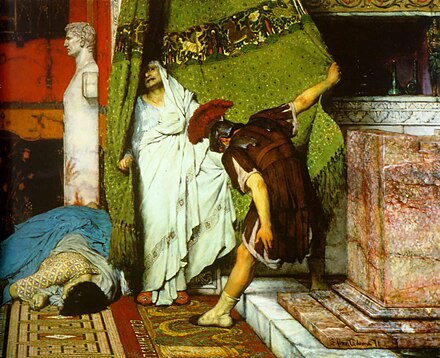Claudius
Tiberius Claudius Caesar Augustus Germanicus[b] (/ˈklɔːdiəs/; Latin: [tɪˈbɛriʊs ˈklau̯diʊs ˈkae̯sar au̯ˈɡʊstʊs gɛrˈmaːnɪkʊs]; 1 August 10 BC – 13 October AD 54) was a Roman emperor, ruling from AD 41 to 54. A member of the Julio-Claudian dynasty, Claudius was born to Drusus and Antonia Minor at Lugdunum in Roman Gaul, where his father was stationed as a military legate. He was the first Roman emperor to be born outside Italy.
As he had a limp and slight deafness due to sickness at a young age, he was ostracized by his family and was excluded from public office until his consulship (which was shared with his nephew, Caligula, in 37). Claudius's infirmity probably saved him from the fate of many other nobles during the purges throughout the reigns of Tiberius and Caligula, as potential enemies did not see him as a serious threat. His survival led to his being declared emperor by the Praetorian Guard after Caligula's assassination, at which point he was the last adult male of his family.
Despite his lack of experience, Claudius was an able and efficient administrator. He expanded the imperial bureaucracy to include freedmen, and helped restore the empire's finances after the excesses of Caligula's reign. He was also an ambitious builder, constructing new roads, aqueducts, and canals across the Empire. During his reign, the Empire started its successful conquest of Britain. Having a personal interest in law, he presided at public trials, and issued edicts daily. He was seen as vulnerable throughout his reign, particularly by elements of the nobility. Claudius was constantly forced to shore up his position, which resulted in the deaths of many senators. Those events damaged his reputation among the ancient writers, though more recent historians have revised that opinion. Many authors contend that he was murdered by his own wife, Agrippina the Younger. After his death at the age of 63, his grandnephew and legally adopted step-son, Nero, succeeded him as emperor.
Claudius was born on 1 August 10 BC at Lugdunum (modern Lyon, France). He had two older siblings, Germanicus and Livilla. His mother, Antonia Minor, may have had two other children who died young. Claudius's maternal grandparents were Mark Antony and Octavia Minor, Augustus's sister, and he was therefore the great-great-grandnephew of Gaius Julius Caesar. His paternal grandparents were Livia, Augustus's third wife, and Tiberius Claudius Nero. During his reign, Claudius revived the rumor that his father Nero Claudius Drusus was actually the illegitimate son of Augustus, to give the appearance that Augustus was Claudius's paternal grandfather.
In 9 BC, Claudius's father Drusus died on campaign in Germania from a fall from a horse. Claudius was then raised by his mother, who never remarried. When his disability became evident, the relationship with his family turned sour. Antonia referred to him as a monster, and used him as a standard for stupidity. She seems to have passed her son off to his grandmother Livia for a number of years.[6]
Livia was a little kinder, but nevertheless sent Claudius short, angry letters of reproof. He was put under the care of a former mule-driver[7] to keep him disciplined, under the logic that his condition was due to laziness and a lack of willpower. However, by the time he reached his teenage years, his symptoms apparently waned and his family began to take some notice of his scholarly interests. In AD 7, Livy was hired to tutor Claudius in history, with the assistance of Sulpicius Flavus. He spent a lot of his time with the latter, as well as the philosopher Athenodorus. Augustus, according to a letter, was surprised at the clarity of Claudius's oratory.[8]


